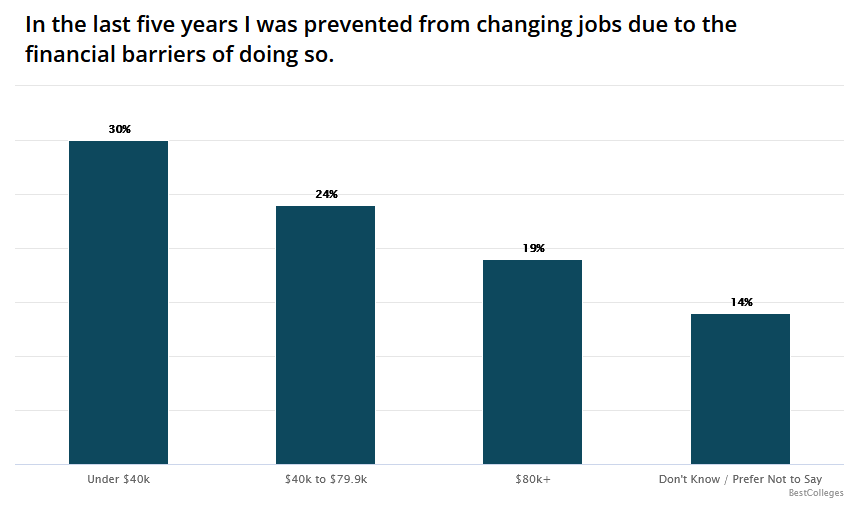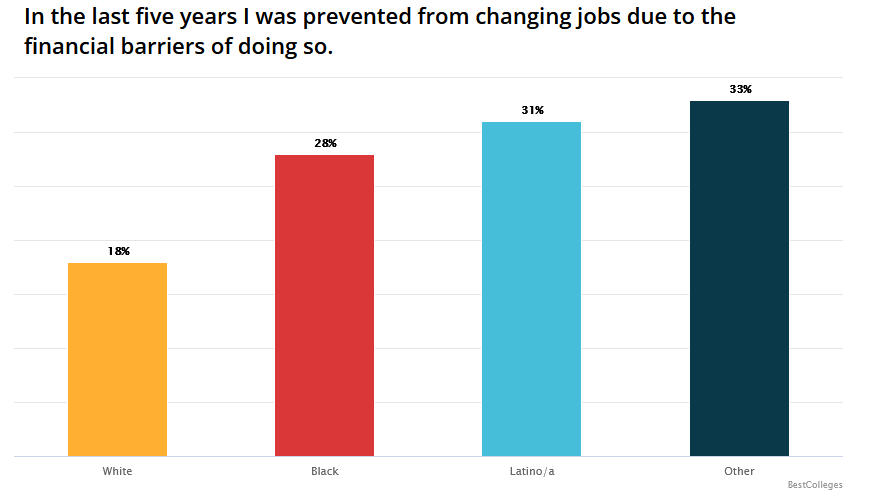By Anna Peel. Originally published at ValueWalk.

The Main Monetary Hurdles Include Gaps in Health Coverage, Unpaid Time Off, and Upskilling/Reskilling Expenses
Working Americans Being Prevented From Changing Jobs Due To Financial Barriers
May 16, 2022 (Seattle, WA) – According to a new survey from BestColleges.com, nearly 1 in 4 (23%) working Americans (defined as full-time, part-time, and freelance workers) say they were prevented from changing jobs in the last five years due to financial barriers. The survey of 1,303 currently employed adults found that the top barriers included costs related to a gap or change in health coverage (36%), taking unpaid time off to job search or interview (32%), and expenses related to upskilling or reskilling (30%).
Q1 2022 hedge fund letters, conferences and more
Most workers (57%) agree that financial barriers make changing jobs more difficult for those with low incomes. Americans making under $40,000 a year are most likely to say they faced financial barriers to getting a new job during the last five years (30%), while about a quarter of workers making $40,000 to $79,999 (24%) and nearly 1 in 5 workers making $80,000 a year or more (19%) say the same.
Workers whose annual income is between $40,000 and $79,999 are most likely to say a gap or change in health coverage (40%, vs. 23% of low and 36% of high earners) is a main monetary hurdle, while low-income Americans with an annual income under $40,000 are most likely to say transportation costs to job search or interview are a main roadblock (30%, vs. 26% of mid and 18% of high earners).
Currently employed white Americans are more likely than employed Black Americans to say a gap or change in health coverage (40% vs. 25%) and taking unpaid time off to job search or interview (34% vs. 23%) are the main financial barriers to changing jobs. Alternatively, Black working Americans are more likely than any other racial or ethnic group to say technology-related expenses to job search or participate in remote interviews are a main roadblock to getting a new job (25%, vs. 16% white and 18% Latino/a).
“As the Great Resignation rages on, there are still some groups of workers for which changing jobs is a financial impossibility,” said Jessica Bryant, analyst for BestColleges.com. “In a world growing ever more costly, even transportation and technology expenses can prevent someone from leaving their current job for a better one.”
Over half of working Americans (54%) agree that getting a better job is worth overcoming financial hardship during an employment transition, 32% neither agree or disagree, and 13% disagree. Overall, 31% of workers believe changing jobs is expensive, and roughly 2 in 5 (39%) agree the government should support those going through employment transitions.
Black (28%), Latino/a (31%), and workers from other racial and ethnic groups (33%) are significantly more likely than white workers (18%) to say that financial barriers prevented them from changing jobs over the last five years. Black workers are more likely than any other racial or ethnic group to believe the government should support workers through employment transitions (53%) and take steps to remove financial barriers of changing jobs (53%).
Methodology
BestColleges.com commissioned YouGov PLC to conduct the survey. All figures, unless otherwise stated, are from YouGov PLC. The total sample size was 1,303 adults. The figures have been weighted and are representative of all U.S. adults (aged 18+) working full-time, part-time, or freelance. Fieldwork was undertaken on April 27-29, 2022. The survey was carried out online and meets rigorous quality standards.
About BestColleges.com
BestColleges.com empowers students to make smarter educational decisions and find schools that best fit their needs through proprietary research, user-friendly guides, and hundreds of unique college rankings. As a trusted education advisor, they also provide a wide array of college planning, financial aid, and career resources to help students realize life goals and overcome educational challenges as they prepare for careers after college.
Updated on
Sign up for ValueWalk’s free newsletter here.





